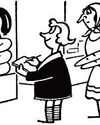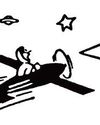WILD SIDE

Wildfires, overdevelopment, and easy access to garbage have brought Tahoe's bears into increasingly close contact with their human neighbors. One local described a bear as "a five-hundred-pound police battering ram."
U.S. JOURNAL
Lake Tahoe, "the jewel of the Sierra Nevada," is an unusually clear, deep alpine lake that is twelve miles wide and twenty-two miles long. It straddles two states: California on the west shore, which is damper and greener, and Nevada on the east, which gives way, almost immediately, to high desert. "A kind of heaven," John Muir called Tahoe, in 1878, after raving about the diameter of its snowflakes and "lusty exercise on snow-shoes." Tahoe is about a third of the size of Yosemite National Park, yet attracts three times the number of annual visitors. During the pandemic, several thousand people, including a lot of Bay Area tech types, fully relocated to the lake, joining seventy thousand or so locals. Tahoe couldn't handle it. The traffic, the noise, the illegal parking-the trash. Last year's Fourth of July crowds left an unprecedented four tons of garbage on the beaches alone. Fodor's named Lake Tahoe one of the world's "natural attractions that could use a break in order to heal and rejuvenate," and suggested that outsiders avoid visiting for a while. The other day in Tahoe, I learned a new word: "touron," a combination of "tourist" and "moron."
This story is from the {{IssueName}} edition of {{MagazineName}}.
Start your 7-day Magzter GOLD free trial to access thousands of curated premium stories, and 9,500+ magazines and newspapers.
Already a subscriber ? Sign In
This story is from the {{IssueName}} edition of {{MagazineName}}.
Start your 7-day Magzter GOLD free trial to access thousands of curated premium stories, and 9,500+ magazines and newspapers.
Already a subscriber? Sign In

The Queen of Bad Influences
Throughout her childhood, Constance called the gorse that grew on the hillsides above her house \"honey-bottle,\" and gathered fistfuls of it despite the spines, so that her hands would smell of it, a smell that seemed to combine oatmeal and hot metal and sun.

MATCH ME IF YOU CAN
“Materialists.”

TOXIC
What the pop culture of the two-thousands did to millennial women.

VISITING DIGNITARY OLD HAUNTS
When Stephen Colbert landed in New Zealand in 2019, his ride from the airport was Jacinda Ardern, the Prime Minister.

ACTION!
Inside the world of intimacy coördinators.
REDDITORS: IMMIGRANTS KEEP KIDNAPPING MY WIFE!!
Immigrants keep taking my wife for up to twenty-four hours, and no one is helping! Police won't do anything. I'm asking this community for advice on this situation!!

WITHOUT BORDERS
A Palestinian doctor in Israel treats people on both sides of the conflict.

ENDANGERED SPECIES: MEAT HOOKS
You pronounce John T. Jobbagy's last name with the accent on the first syllable: “Joe-bagee.”

TRAILBLAZER DEPT.SPACE ODYSSEY
The other day, amid throngs of schoolkids, a septuagenarian woman with a puff of gray hair, in a black turtleneck and pearl earrings, stepped into the Rose Center for Earth and Space.

PHOTO BOOTH
How American Photography Came Into Its Own
